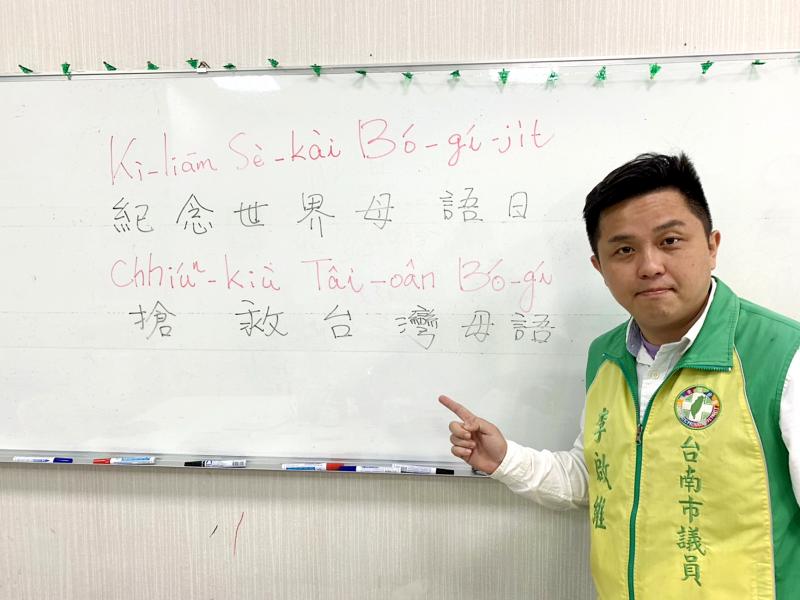Tainan City Councilor Lee Chi-wei (李啟維) yesterday called for the use of Romanized spellings to make Taiwanese dialects and languages internationally recognizable.
Speaking at a news conference in Tainan to mark International Mother Language Day, Lee said the use of zhuyin fuhao (注音符號, Mandarin phonetic symbols commonly known as Bopomofo) made it difficult to promote interest in, or recognition of, the nation’s dialects and languages, as the system is not commonly used outside of Taiwan.
“The legislature has already passed the Development of National Languages Act (國家語言發展法), but under the current circumstances that act is like a candle in the wind,” he said, describing it as ineffectual given the lack of a Romanized system.

Photo: Tsai Wen-chu, Taipei Times
Taiwan’s achievements in technology and combating the spread of COVID-19 have earned it international recognition, but it has not achieved the same success in promoting interest in its languages, he said.
The education system, through which Taiwanese learn to use Bopomofo, failed to recognize its shortcomings, he said, adding that using Romanization to teach students would be in line with the government’s expressed interest in “internationalizing” the nation.
Lee, of the Democratic Progressive Party, said he had met older Taiwanese who are unable to read their vehicle license plates, because they had never learned the English alphabet.
Taiwan uses English letters for its license plates, because this is the international standard, so the country’s dialects should also be written according to this standard, he said.
“Zhuyin fuhao has 37 symbols, which are usable only to describe Chinese phonetics. In contrast, English has only 26 letters and can be used to write languages worldwide,” he said, adding: “Can the government not follow that reasoning?”
Although he recognized the arguments made by those promoting localization, Lee said that he was concerned to see Taiwan’s languages disappear into obscurity.
“Perhaps if it weren’t for missionaries who wrote down Taiwan’s dialects for use in proselytizing, they would not have survived until today,” he said.

The Executive Yuan yesterday announced that registration for a one-time universal NT$10,000 cash handout to help people in Taiwan survive US tariffs and inflation would start on Nov. 5, with payouts available as early as Nov. 12. Who is eligible for the handout? Registered Taiwanese nationals are eligible, including those born in Taiwan before April 30 next year with a birth certificate. Non-registered nationals with residence permits, foreign permanent residents and foreign spouses of Taiwanese citizens with residence permits also qualify for the handouts. For people who meet the eligibility requirements, but passed away between yesterday and April 30 next year, surviving family members

The German city of Hamburg on Oct. 14 named a bridge “Kaohsiung-Brucke” after the Taiwanese city of Kaohsiung. The footbridge, formerly known as F566, is to the east of the Speicherstadt, the world’s largest warehouse district, and connects the Dar-es-Salaam-Platz to the Brooktorpromenade near the Port of Hamburg on the Elbe River. Timo Fischer, a Free Democratic Party member of the Hamburg-Mitte District Assembly, in May last year proposed the name change with support from members of the Social Democratic Party and the Christian Democratic Union. Kaohsiung and Hamburg in 1999 inked a sister city agreement, but despite more than a quarter-century of

Taiwanese officials are courting podcasters and influencers aligned with US President Donald Trump as they grow more worried the US leader could undermine Taiwanese interests in talks with China, people familiar with the matter said. Trump has said Taiwan would likely be on the agenda when he is expected to meet Chinese President Xi Jinping (習近平) next week in a bid to resolve persistent trade tensions. China has asked the White House to officially declare it “opposes” Taiwanese independence, Bloomberg reported last month, a concession that would mark a major diplomatic win for Beijing. President William Lai (賴清德) and his top officials

‘ONE CHINA’: A statement that Berlin decides its own China policy did not seem to sit well with Beijing, which offered only one meeting with the German official German Minister for Foreign Affairs Johann Wadephul’s trip to China has been canceled, a spokesperson for his ministry said yesterday, amid rising tensions between the two nations, including over Taiwan. Wadephul had planned to address Chinese curbs on rare earths during his visit, but his comments about Berlin deciding on the “design” of its “one China” policy ahead of the trip appear to have rankled China. Asked about Wadephul’s comments, Chinese Ministry of Foreign Affairs spokesman Guo Jiakun (郭嘉昆) said the “one China principle” has “no room for any self-definition.” In the interview published on Thursday, Wadephul said he would urge China to